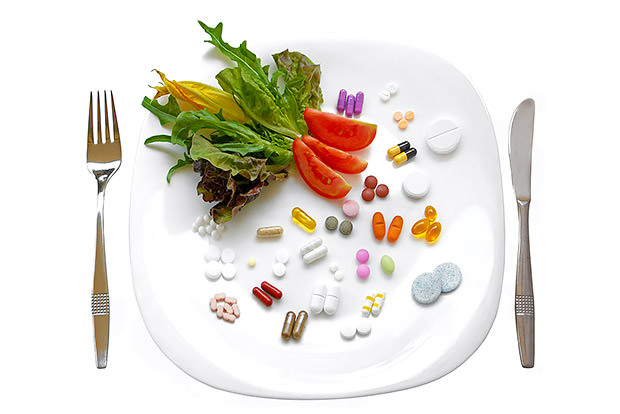
Vitamin and mineral supplements should add to a nutritious diet, not replace healthy foods altogether. Here are a few reasons you should avoid depending on pills and powders for your nutrient intake.
We don’t know it all.
Researchers have not identified all the active components in food. New, beneficial phytochemicals are being discovered every day. When you replace whole foods with supplements, you miss out on those food components that benefit your health but are not yet fully understood.
Too much of a good thing.
Recommended healthy ranges for nutrient intake are based on what research tells us the body needs to function at its best. Consuming vitamins and minerals beyond what the body needs will not increase your energy or protect against disease. High doses of individual nutrients, especially fat-soluble vitamins and minerals, may exceed safe levels of intake and cause toxicity.
Added nutrients don’t always provide the same benefit.
In addition to pills and powders, some supplements are used to fortify or enrich foods. Foods with added fiber are a good example. There is reason to believe that fiber found naturally in food is superior to that added during processing. In a study published in the Journal of the Academy of Nutrition and Dietetics, researchers found that when given a bar high in added fiber (10 grams), subjects reported no effect on fullness but did report increased gas and bloating when compared to a low fiber bar.
Few nutrients act alone.
Nutrients naturally occur in a complex combination and often rely on reactions with other food components to function properly. For example, the role of vitamin D and calcium are closely related, as well as the role of folate and vitamin B12. Ingesting high doses of one vitamin or mineral may cause an imbalance. Eating a variety of whole foods provides a better balance of nutrients so that each can perform its function.
Dietary supplements are regulated like foods, not drugs.
The Dietary Supplement Health and Education Act (DSHEA) defines a dietary supplement as any product in pill, powder, or liquid form that is meant to supplement the diet, such as a vitamin, mineral, herb, botanical, or amino acid. The regulation of dietary supplements falls under the U.S. Food and Drug Administration (FDA), but they are regulated like foods, not drugs. This means that FDA approval is not required before they are sold to the public. As a result, the purity of the products and dose recommendations are not required to undergo the same rigorous scientific testing as a drug before becoming available to the public.
While most professionals recommend getting nutrients from healthy foods versus supplements, there are conditions and stages in life when supplementation may be necessary. Some examples include:
- Women of childbearing age.
- Women who are pregnant or breastfeeding.
- Older adults.
- Vegans.
- Those diagnosed with nutrient deficiencies or conditions that reduce nutrient absorption.
Talk with your doctor if you fall into these categories. He or she can help you determine the correct supplements and doses for your specific needs.
Sources



 3 Healthy Lunches for Your Work Week
3 Healthy Lunches for Your Work Week
 5 Tips for Stretching Your Budget for Healthy Food
5 Tips for Stretching Your Budget for Healthy Food
 Best Ways to Reduce Added Sugar
Best Ways to Reduce Added Sugar
 Healthy Tips to Lighten Up Picnic Foods
Healthy Tips to Lighten Up Picnic Foods
 Do You Need to Drink Milk?
Do You Need to Drink Milk?
 Tips to Keep Track of Water Intake
Tips to Keep Track of Water Intake
 Butter vs. Margarine: What’s the Best Choice?
Butter vs. Margarine: What’s the Best Choice?
 Healthy Eating Myths
Healthy Eating Myths

 Pinterest
Pinterest RSS Feed
RSS Feed